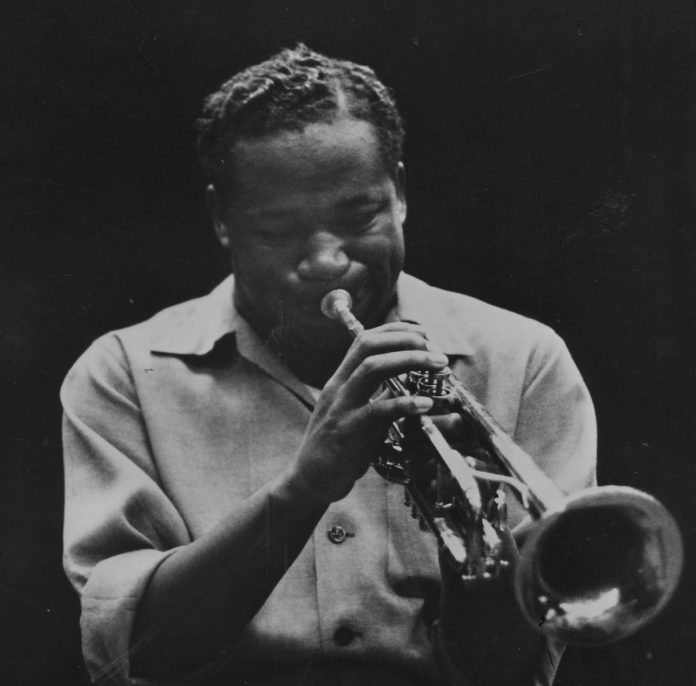Having named vibraphonist Joe Locke and his band’s recording of Make Me Feel Like It’s Raining (from Subtle Disguise) as my ubiquitous track of the pandemic, I see – or hear – other performances anew. It’s often a comic experience.
Beside Locke’s tribute to Bobby Hutcherson, Tubby Hayes’s galloping tenor sax on Mini-Minor, as recorded at Ronnie Scott’s, Gerrard Street, in 1965, reminds me of someone repeatedly knocking at a door signed “No Entry”: the longer he is barred, the more furious – and tedious – become his attempts to get in, while less frenetic colleagues are stepping on the “Welcome” mat and gaining entrance at an ever-open door around the corner.
For 10 years after that recording, I could just about stand the unabated chorus-chasing, which never shared the spiritual uplift that accompanied Coltrane’s. After that, it just sounded like someone showing off, the musical equivalent of riding a bike with arms folded.
Such sense of non-admittance perhaps occurred to Miles Davis when comparing his playing with that of Dizzy Gillespie with Charlie Parker, but his solution was to tiptoe away. Davis could never compete with Dizzy as an air-splitting technician and in any case was unsuited in temperament to that music. How Davis must have listened with envy to Clifford Brown and his ilk. They combined dexterity with grace, sort of warm and cool.
Brown’s loss to jazz was incalculable. I still see Hayes, despite the foregoing, as unfairly representative of embattlement and the idea that British players could match the Americans if only the taste-makers would take heed. The Americans knew better: they understood Hayes’s worth, but that couldn’t make the 1965 Mini-Minor major-major.
Chuck Berry’s sentiments have resonance here:
I’ve got no kick against modern jazz
Unless they try to play it too darn fast
And lose the beauty of the melody
Until they sound just like a symphony
On Mini-Minor, Hayes plays too darn fast. But that last line is an example of what Kingsley Amis called “lyric exhaustion”, the rhymester driven into a blind alley. “Until they sound just like a symphony”? What does that mean? Does Hayes’s relentless splattering of notes as though he’s in charge of a Maxim gun rather than a musical instrument amount to anything symphonic? Not to this listener. It amounts, rather, to excess, a condition with which Hayes was only too familiar. After the first performance of Die Entführung Aus Dem Serail, Emperor Joseph II is supposed to have told the composer: “Too many notes, dear Mozart, too many notes.” To which the wunderkind is said to have replied: “There are only as many notes as I require; no more and no less.” Quite.
It’s tempting to ascribe manic note-spinning to testosterone but there are plenty of note-spinning female performers. [Check female bedroom rock-guitar players on YouTube – Ed]. This doesn’t mean though that there isn’t a difference between men and women performers. The raw aggression of some jazz is uncommon among performances by women, but also the numbers differ. A random survey of 180 jazz CDs in reach as I write this column includes barely 20 female headliners. Their appearance in compilations or chart lists include Memphis Minnie and Bessie Smith, standing their ground among 15 blues singers of the Mississippi Delta, as well as the Brown Skin Girls ranged anonymously in Clarence Lofton’s imagination as he salivates at the piano:
Got a gang of brownskin womens (sic), bunch of high yellows too
I got so many brownskins, I don’t know what to do
One for every day of the week, no less, and none with a name.
Mention of Gillespie reminds me that I now admire Roy Eldridge more. Which in turn reminds me that an Eldridge LP was the last I borrowed from the US Embassy library in London. You could take your pick from a list and the record would arrive in a brick-red, LP-shaped box constructed from an amalgam hitherto and henceforth rare in materials science. It had khaki-coloured cloth straps.
They were days of American cultural largesse. Borrowers paid nothing, not even postage; and, as I used to discover, they could extend the hire period from the regulation two weeks to supernumerary six months without remonstration from the Ambassador. Not that I did more than once.
Every LP was of Stateside manufacture, meaning that the cover was made from stout cardboard and the liner notes were by Leonard Feather. It was the rental scheme that first introduced me to Lu Watters’s Yerba Buena Jazz Band. To remind myself of Watters now I’d have to browse another website, run by the University of Stanford libraries and called “The San Francisco Traditional Jazz Foundation Collection”.
And there was I thinking that “traditional jazz” was a UK label used to describe how music powered by a metronomic banjo had something to do with an American renaissance in which an ex-trumpeter starting out with no teeth was prominent – and hit as few notes as possible to some purpose.


